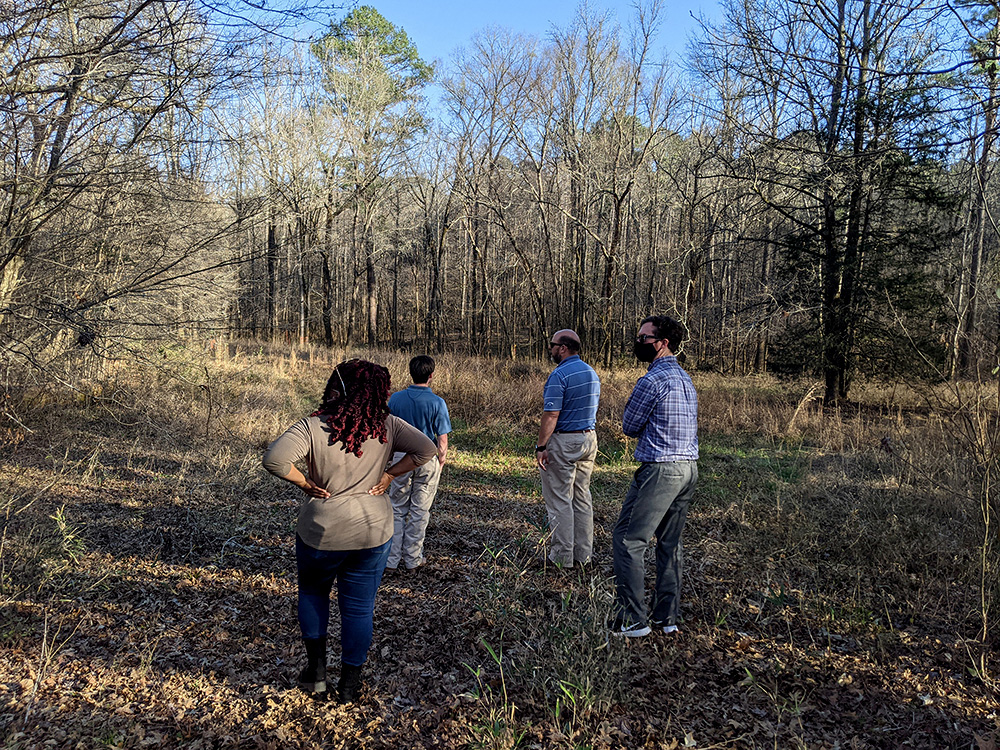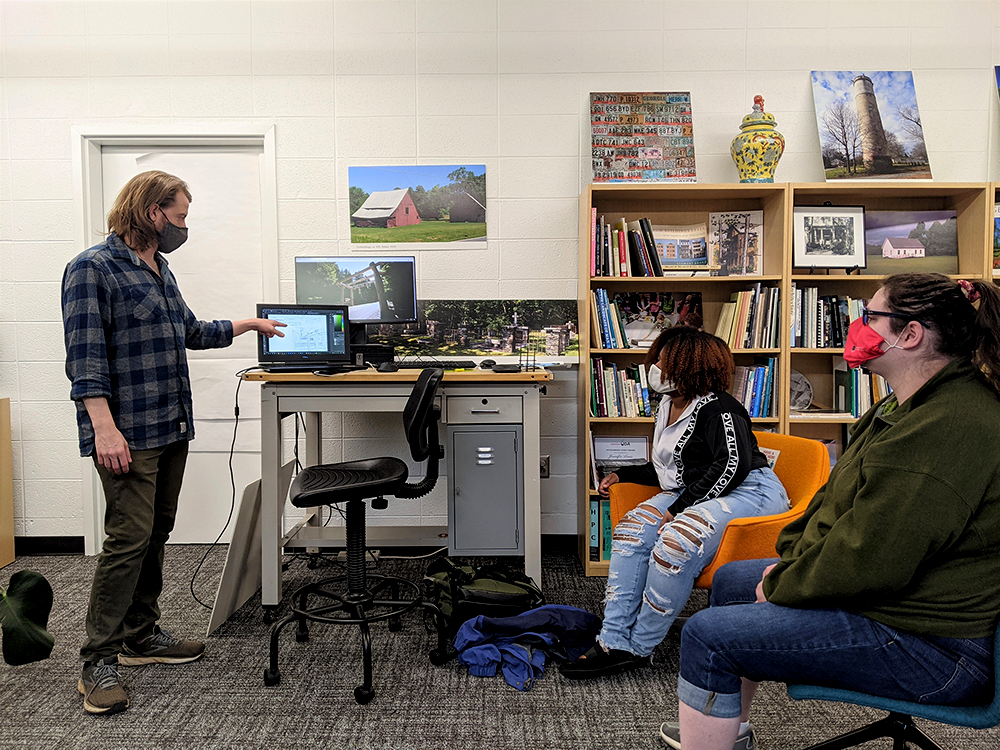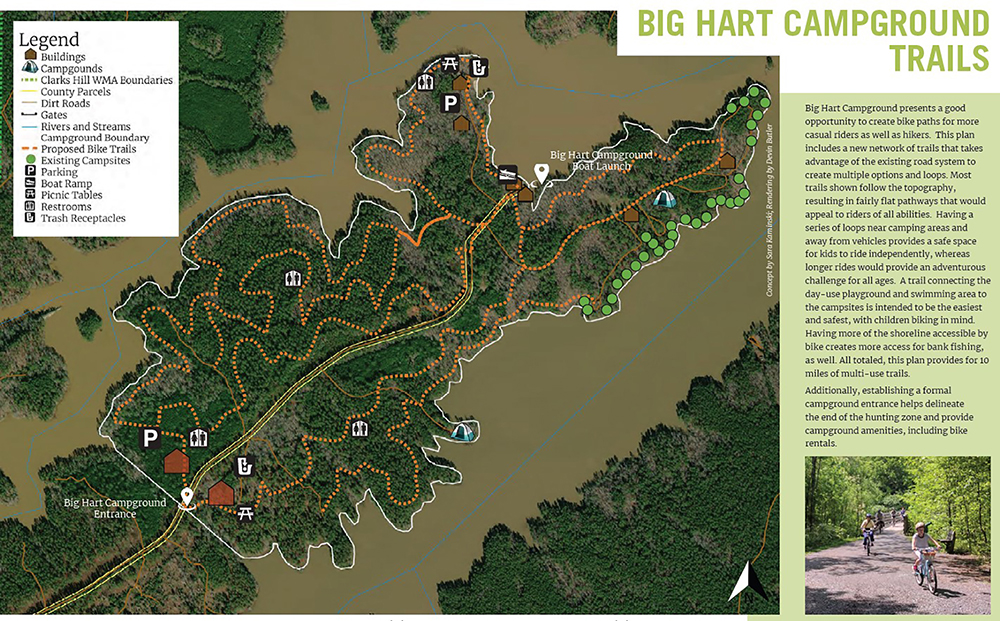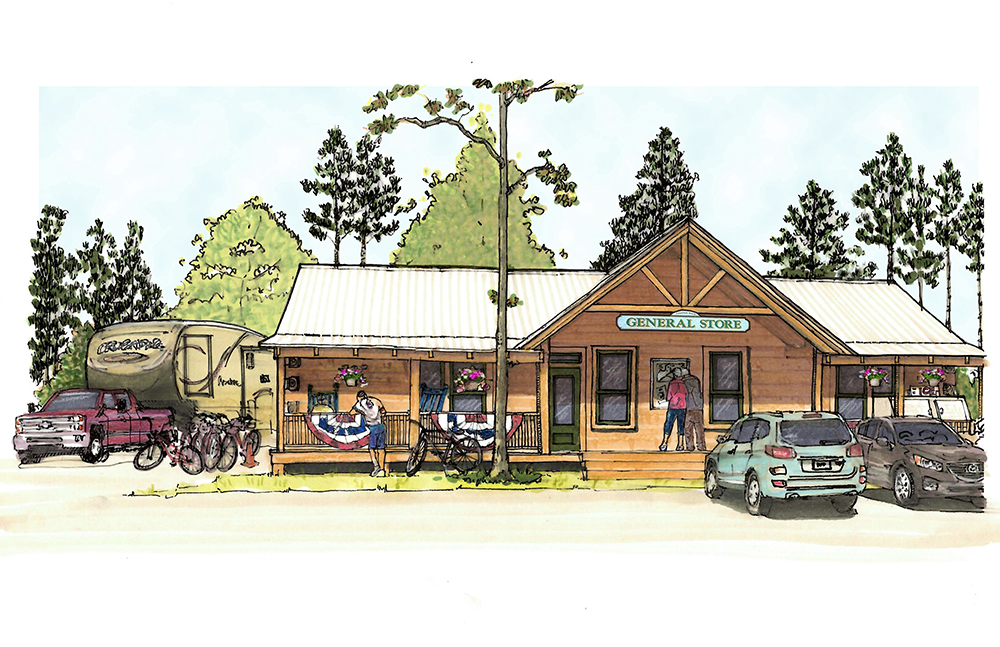McDuffie County Trails Charrette

College of Environment and Design student Devin Butler (L) and McDuffie County Archway Professional Sam Perren (R) tour a potential boat launch along the Little River with McDuffie County Manager David Crawley and County Planner, Chase Beggs. (Credit: Jennifer Lewis)
McDuffie County, Ga. - The McDuffie County Archway Partnership enlisted design assistance from the College of Environment and Design (CED) in order to increase recreational opportunities around Clarks Hill Lake, one of the largest man-made lakes east of the Mississippi River. Led by the CED Center for Community Design and Preservation, graduate students from the college’s landscape architecture and urban planning programs have provided a master plan that includes concepts tailored to kayaking enthusiasts, hikers, campers, recreational cyclists, and equestrians.
Clark’s Hill Lake and adjacent land are controlled by the U.S. Army Corps of Engineers (Corps), which leases the majority of McDuffie County shoreline to the Georgia Department of Natural Resources (DNR) for a Wildlife Management Area (WMA). McDuffie County holds lakefront leases on two former Corps campgrounds – Big Hart and Raysville – and has successfully increased visitation numbers over the last five years.
Also, in collaboration with the Georgia River Network, Wilkes and McDuffie Counties have established Georgia’s Little River Water Trail, a 20-mile paddling route along the McDuffie and Wilkes County borders. Students with the UGA College of Engineering have recently designed plans for a motor boat launch on the Little River at Highway 80, which would complete a group of four public access points on the water trail. Additionally, students with the Terry College of Business’s Institute for Leadership Advancement have researched the economic benefits of a trail system and explored marketing opportunities.
The McDuffie County Archway Partnership asked the Center for Community Design and Preservation to augment these efforts by developing concepts and an illustrative master plan for additional boat launches along the water trail and a land-based trail system to support their application for a Georgia Outdoor Stewardship Program (GOSP) grant. Given that the GOSP grant funds large-scale projects, this presented an opportunity to consider outdoor recreation improvements more broadly – including adding amenities to current boat launches and considering improvements to county-managed campgrounds as well as exploring concepts for hiking, biking, and equestrian trails.

College of Environment and Design (CED) students (L-R) David Evans, Freja Carlson, Row Jerles, Natalie Glaze and Devin Butler participate in a brainstorming exercise to during a virtual charrette held on campus. (Credit: Jennifer Lewis)
CCDP used a design charrette – a multi-day brainstorming session between design experts and local stakeholders – to bring together a team of CED students in landscape architecture and planning to explore potential improvements. The goal of the charrette was to envision how to satisfy the county’s desire for recreational economic development with DNR’s priority to serve hunters and fishermen, and to incorporate best practices between different types of trail users. The charrette concentrated on the Little River Water Trail between Highway 80 and Highway 78 within the Clarks Hill Wildlife Management Area, as well as the McDuffie County campgrounds at Big Hart and Raysville. Due to Covid-19, this charrette was conducted with virtual meetings, two on-campus workdays, and extended periods of public input solicited through YouTube presentations and online surveys.

CED students (L-R) Row Jerles, Devin Butler, and Sara Kaminski discuss potential McDuffie County campground improvements during a virtual charrette held on campus at the Center for Community Design and Preservation. (Credit: Jennifer Lewis)
Using case studies, recreational industry best practices and public feedback, the proposed design concepts enhance the already attractive opportunities around the lake with new ideas meant to increase accessibility for a wider segment of the public. These concepts accommodate self-shuttling for paddlers on the Little River Water Trail, create a trail system for hikers and bike riders within the Big Hart and Raysville campgrounds, and suggest how equestrian trails may be included within the Clarks Hill Wildlife Management Area.
During the survey portion of the charrette, local citizens were asked which of the ideas in the recreation plan they would like to see become a reality. One family stated, “We think the upgrades to Big Hart would make it a regional camping destination which would bring more visitors to the area. We are a multigenerational family living minutes from Big Hart and Little River and we really like the ideas presented …. The suggested upgrades would increase our use of the areas.” Respondents also highlighted their excitement about more accessible outdoor recreation. One stated, “I love the idea of kayak/canoe launch, restrooms, picnic area, and even the outfitters/shuttle possibility. A swimming beach would be nice at the Raysville area.” Another respondent expressed enthusiasm over making outdoor leisure more attainable to those in the community, stating, “...It seems like the community would use this [water trail] the most, and it seems like the easiest to upkeep. McDuffie is a lower income community, so having kayaks available to rent would be a cheap and easy way to get out and have fun in the summer.”

The charrette team proposed a series of hiking and biking trails for Big Hart Campground to take advantage of acreage in the campground. (Credit: Map by Sara Kaminski and Devin Butler)
The McDuffie County Trails charrette presents the idea that enhancing the natural resource-based outdoor experiences in McDuffie County with a wide variety of users in mind will provide value far beyond the local market, extending opportunities to a regional audience. Feedback from the public further showed the community’s support for investment in recreation tourism and the generous returns in the form of natural resource protection, economic development, and health promotion.

An illustration of a proposed campground office and general store, recommended by the charrette team to enhance the Big Hart Campground. (Credit: Illustration by Jennifer Lewis)
For more information on the charrette and to view the team’s final deliverables, visit
https://ced.uga.edu/pso/charrettes/past-charrettes/
Contact: Jennifer Lewis, 706-542-6760, jmlewis@uga.edu
